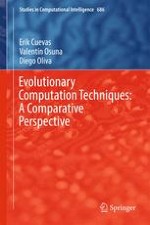2017 | OriginalPaper | Chapter
6. Photovoltaic Cell Design
Authors : Erik Cuevas, Valentín Osuna, Diego Oliva
Published in: Evolutionary Computation Techniques: A Comparative Perspective
Publisher: Springer International Publishing
Activate our intelligent search to find suitable subject content or patents.
Select sections of text to find matching patents with Artificial Intelligence. powered by
Select sections of text to find additional relevant content using AI-assisted search. powered by
